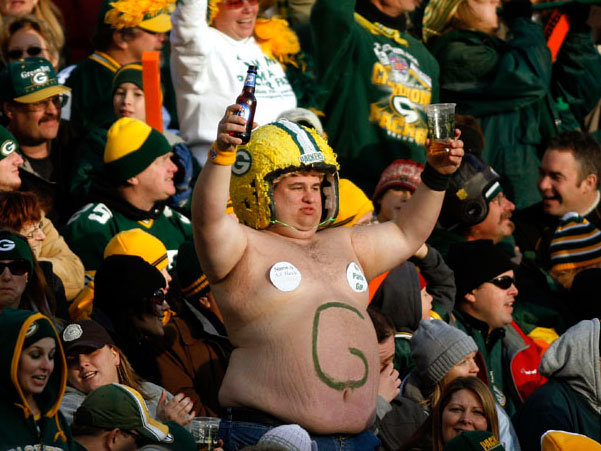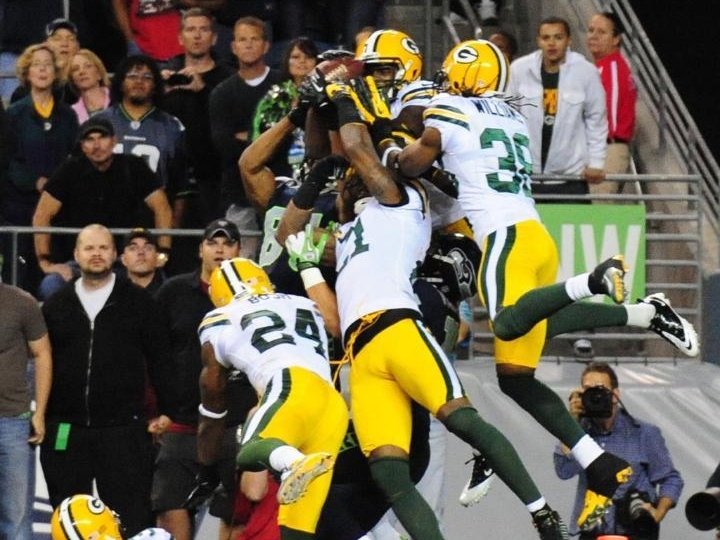One of the easiest things in the world to be is a sport fan. All you need is a television set, a remote, some chips and dip, a few beers, a radio and a telephone and you are just about set.
One of the toughest things in the world to be is a great sports fan. It's easy to be loud and obnoxious. It's easy to be passionate. But it's very, very hard to be a great fan.
Here are 10 tips to being a great sports fan:
1. Go To A Game Or Two -- If you really want to be a great sports fan, you have to actually go to a game or two or three. It is impossible to be a great sports fan when you only see your team on television or listen on radio. On TV, you are letting someone else decide what you see. When you are at the game in person, you can choose what to see, and you see a great deal more that might help shape your opinion. If you never go to a game, you can never be a great fan.
2. Develop Your Own Standards -- This is not something that is carved in stone. Standards can be different for various teams. For example, the standard of success for the Bucks might be make the playoffs. The standard for the Packers might be to make it to the title game. And standards change as teams get better and worse. But make sure you know what your standard is and stick to it.
3. Don't Get Buried In Stats -- All of the statistics can divert attention from the real guts of sports. In its purest form, sport is really pretty simple. You've got a ball and there are a few different things to do with it. Hit it, catch it, shoot it, kick it. As someone, probably a politician, said, you can make statistics do just about anything if you try hard enough. So use stats as a guide, perhaps, but don't get too wrapped up in them. There is no statistic, for example, that measures the character and courage of an athlete.
4. Don't Believe Anything An Athlete Says In Public -- This may be a slight overstatement, but not much. Athletes take courses in how to deal with the public and the press. They learn how to avoid answering questions and how to say what they want to say. Think Bill Clinton in a jockstrap. Nah, something else. Generally speaking, athletes don't want to say anything that's even remotely controversial. Perhaps the greatest I've ever seen doing this is Robin Yount, who never, ever publicly said anything worth printing or broadcasting. He even used the phrase "play them one at a time" and he obviously meant it. He was the ultimate canned answer guy. So don't let public communications from athletes influence your behavior.
5. For Information And Other Stuff Read The People Who Write Don't Listen To The People Who Talk -- For good information and viewpoints that mean something, read a newspaper or an online magazine or even some blogs. Forget the talkers. Local television newscasts have cut sports segments to just about zero. Some stations don't even use the sports guys in their promotions. How much can you get from a guy who is allowed 15 seconds to tell you the complete story? And talk radio is a vast sea of strident shouters with an occasional island of sanity. The problem with sports talk radio is that there are too many guys who grew up watching sports on television and reading sports magazines in their bedrooms and pretending they were announcers with Mr. Microphone. They never put on a jersey to play or a pair of cleats or learned how to hit a backhanded lob shot. People who write for a living have relationships that stimulate knowledge and they really don't worry about pleasing people. In this area, the people you should read are Tom Enlund, Bob Wolfley, Jason Wilde, Tom Silverstein, Tom Haudricourt and this new kid, Anthony Witrado, Gary D'Amato, Drew Olson, Bob McGinn (even though he thinks he's a coach not a reporter), Me. You may not agree, but at least none of these writers panders.
6. Have A Big Tent And Don't Forget The Girls -- Some guys think being a sports fan is all about the guys. But not anymore. Your wife or girlfriend might know just as much as you do. And like the rest of the world, we are all better off when the girls are involved. So if you scoff at the girls, you are cutting off your nose to spite your face.
7. Don't Be A Know It All -- Understand that you almost certainly don't know as much as the general manager or the coach or the manager. You might think you do, but you're kidding yourself. They do this for a living and you do it as a hobby. You can make suggestions and let people hear your ideas, but if you start thinking you know it all, it becomes obvious you don't. Running a sports team is a complex business. Solutions to problems are not simple. They are complex. Talk radio is filled with know it alls on both ends of the microphone.
8. Don't Be A Drunken Fool -- I like a cold beer as much as the next guy. But if you become a drunken lout, there's no way you can make an accurate assessment about your team. When you go to a game, if you have to worry about whether you've got enough money left for another beer, you've had too much. I used to know a guy who was a pretty good guitar player. When he was drunk, he thought he was a spectacular guitar player. In reality, he rarely hit the right note when drunk.
9. Hold The Bastards Accountable -- Great fans are not sheep. They do not follow blindly down the same primrose path year after year. These teams ask us for our love and our money. But let's make sure they are worthy. Sports is about winning and growth. Absent those two things, it's time to ask hard questions, over and over until there are answers. A great fan is a critical fan. But he understands the difference between critical thought and criticism to just act like a jerk. Nobody likes jerks.
10. Be Brave -- Great fans have the courage of their convictions. Other people may shout at them, throw statistics at them like paintballs, laugh in their face. But great fans have a quiet confidence about them and they stay true to their beliefs. Don't be wishy-washy. Wanting to fire Ned Yost one week and then saying he is great the next week is not an example of great fandom. It's an example that you could be a running mate for Hillary Clinton.
That's it folks. See where you measure up. And use this as a guide to help you improve.
With a history in Milwaukee stretching back decades, Dave tries to bring a unique perspective to his writing, whether it's sports, politics, theater or any other issue.
He's seen Milwaukee grow, suffer pangs of growth, strive for success and has been involved in many efforts to both shape and re-shape the city. He's a happy man, now that he's quit playing golf, and enjoys music, his children and grandchildren and the myriad of sports in this state. He loves great food and hates bullies and people who think they are smarter than everyone else.
This whole Internet thing continues to baffle him, but he's willing to play the game as long as OnMilwaukee.com keeps lending him a helping hand. He is constantly amazed that just a few dedicated people can provide so much news and information to a hungry public.
Despite some opinions to the contrary, Dave likes most stuff. But he is a skeptic who constantly wonders about the world around him. So many questions, so few answers.





